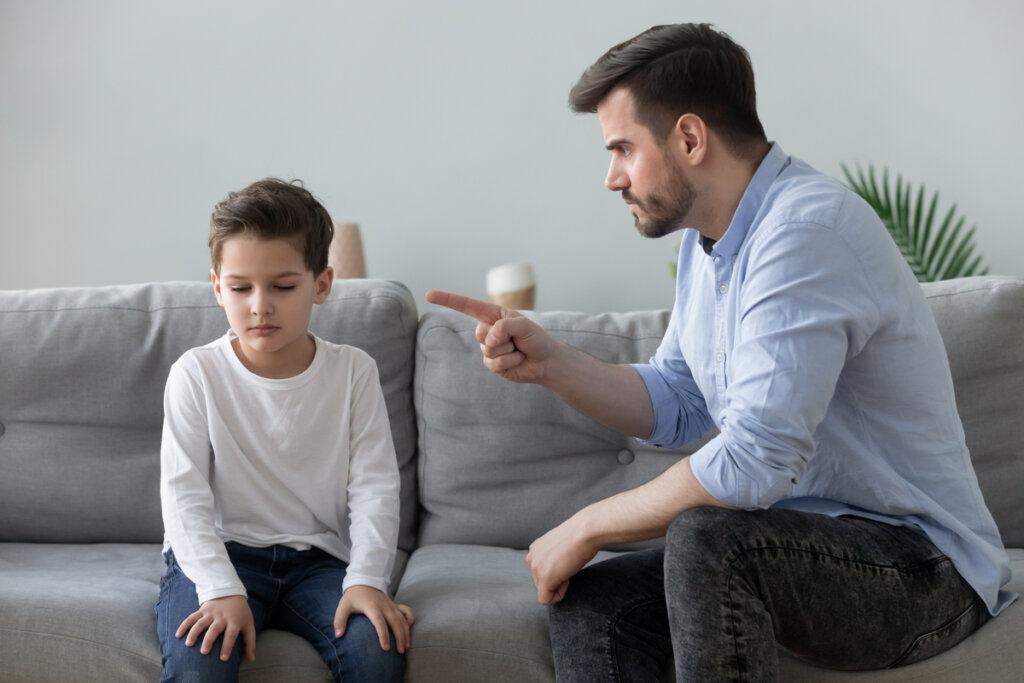The Danger of Parents Living Through Their Children


Written and verified by the psychologist Elena Sanz
Some claim that young people today are selfish for not choosing to go down the paths of fatherhood or motherhood. Yet, perhaps what’s happened is that they’re more aware.
Indeed, they probably know that raising another human being is an enormous responsibility that requires a large dose of emotional maturity. If this isn’t present, parents end up living through their children.
This is a reality that many adults today have suffered and many minors continue to experience. In these kinds of upbringings, parents design the future of their children, make decisions for them, or weigh them down with the burden of their own happiness. These attitudes give rise to dysfunctional dynamics that deeply damage children and from which, sometimes, they never recover.
A child isn’t an extension of their parents
It’s true that children are the result of what their parents transmit to them and their personalities and attitudes are the fruit of the nurturing work that their parents carry out. However, parents are not their letters of introduction to the world.
Nevertheless, some parents adopt this assumption and place impossible demands on their children. They expect exemplary behaviors, successes, and achievements from them in all areas of their lives. This isn’t for the happiness of their children but because of the way the parents want to project themselves in front of others.
In some way, these parents consider that their children’s lives reflect their own values, both as parents and people. This places a burden on children that they often find difficult to bear. In fact, they’re asked to be calm, docile, and obedient, to behave like miniature adults, and to give up the noise, laughter, and mischief so typical of childhood.
As they grow older, these pressures translate into countless after-school activities, camps, classes, and events that these children don’t necessarily want to attend, but must comply with in order to fit into the socially perfect prototype.
Their mistakes aren’t understood but punished and their freedom to decide and experiment is conspicuous by its absence. In fact, the scripts of their lives are already written and the only path available is to follow them.

The danger of parents living through their children
In other cases, the pressure comes, not from a quest for perfection, but from the parent’s desire for their children to live the lives that they themselves think are correct.
Sometimes, this translates into the obligation to follow in the footsteps of the parents. For instance, to continue with the family business, develop the same professional path, or adopt the same lifestyle. If they should dare to not comply with these mandates, for reasons of personal choice, their parents view it as a lack of loyalty.
In other cases, parents may intend that their children fulfill their own frustrated dreams. Consequently, they’re urged to experience all that their parents didn’t have access to, even if it’s not at all what they want or need themselves.
It could even be the case that the two previous situations coexist, creating a real state of confusion. For example, the parent wants their child to study for a degree (because they couldn’t) and be professionally ambitious (as they had to give up their dreams to have a family) but, at the same time, they blame their child for having those opportunities.

The weight of carrying the happiness of others
Ultimately, parents who live through their children, weigh them down with the burden of their own happiness. In fact, their well-being depends on their children succeeding, behaving, or meeting their expectations.
If a child fails, or just decides for themselves, the parents feel personally affronted. Frequently, if the child decides to form their own life away from the parental home, the parents experience it as a betrayal or abandonment.
These parents are living through their children, placing their own expectations on them, forgetting their individuality, and linking their destiny to their own wishes. They do this by interfering in their personal relationships (even when they’re adults), judging their choices, preferences, and interests, or overprotecting them to the point of making them dependent.
The objective of a healthy upbringing is to educate free and autonomous individuals, something that constitutes a true act of detachment. However, it’s really easy for parents to view children as a kind of refuge from their own fear of loneliness.
They view them as compensation for what they themselves couldn’t experience or an element on which to focus all their attention so they don’t have to take charge of themselves. It’s essential to break this trend.
If today, as an adult, you feel that your parents were those who lived through you, as their child, it’s important that you spend some time analyzing how this has influenced your personality and career.
You may even need some help to start prioritizing yourself. Nonetheless, it’s even more relevant if you have children yourself. In this case, make sure you work on yourself and take responsibility so as not to continue perpetuating these damaging patterns.
Some claim that young people today are selfish for not choosing to go down the paths of fatherhood or motherhood. Yet, perhaps what’s happened is that they’re more aware.
Indeed, they probably know that raising another human being is an enormous responsibility that requires a large dose of emotional maturity. If this isn’t present, parents end up living through their children.
This is a reality that many adults today have suffered and many minors continue to experience. In these kinds of upbringings, parents design the future of their children, make decisions for them, or weigh them down with the burden of their own happiness. These attitudes give rise to dysfunctional dynamics that deeply damage children and from which, sometimes, they never recover.
A child isn’t an extension of their parents
It’s true that children are the result of what their parents transmit to them and their personalities and attitudes are the fruit of the nurturing work that their parents carry out. However, parents are not their letters of introduction to the world.
Nevertheless, some parents adopt this assumption and place impossible demands on their children. They expect exemplary behaviors, successes, and achievements from them in all areas of their lives. This isn’t for the happiness of their children but because of the way the parents want to project themselves in front of others.
In some way, these parents consider that their children’s lives reflect their own values, both as parents and people. This places a burden on children that they often find difficult to bear. In fact, they’re asked to be calm, docile, and obedient, to behave like miniature adults, and to give up the noise, laughter, and mischief so typical of childhood.
As they grow older, these pressures translate into countless after-school activities, camps, classes, and events that these children don’t necessarily want to attend, but must comply with in order to fit into the socially perfect prototype.
Their mistakes aren’t understood but punished and their freedom to decide and experiment is conspicuous by its absence. In fact, the scripts of their lives are already written and the only path available is to follow them.

The danger of parents living through their children
In other cases, the pressure comes, not from a quest for perfection, but from the parent’s desire for their children to live the lives that they themselves think are correct.
Sometimes, this translates into the obligation to follow in the footsteps of the parents. For instance, to continue with the family business, develop the same professional path, or adopt the same lifestyle. If they should dare to not comply with these mandates, for reasons of personal choice, their parents view it as a lack of loyalty.
In other cases, parents may intend that their children fulfill their own frustrated dreams. Consequently, they’re urged to experience all that their parents didn’t have access to, even if it’s not at all what they want or need themselves.
It could even be the case that the two previous situations coexist, creating a real state of confusion. For example, the parent wants their child to study for a degree (because they couldn’t) and be professionally ambitious (as they had to give up their dreams to have a family) but, at the same time, they blame their child for having those opportunities.

The weight of carrying the happiness of others
Ultimately, parents who live through their children, weigh them down with the burden of their own happiness. In fact, their well-being depends on their children succeeding, behaving, or meeting their expectations.
If a child fails, or just decides for themselves, the parents feel personally affronted. Frequently, if the child decides to form their own life away from the parental home, the parents experience it as a betrayal or abandonment.
These parents are living through their children, placing their own expectations on them, forgetting their individuality, and linking their destiny to their own wishes. They do this by interfering in their personal relationships (even when they’re adults), judging their choices, preferences, and interests, or overprotecting them to the point of making them dependent.
The objective of a healthy upbringing is to educate free and autonomous individuals, something that constitutes a true act of detachment. However, it’s really easy for parents to view children as a kind of refuge from their own fear of loneliness.
They view them as compensation for what they themselves couldn’t experience or an element on which to focus all their attention so they don’t have to take charge of themselves. It’s essential to break this trend.
If today, as an adult, you feel that your parents were those who lived through you, as their child, it’s important that you spend some time analyzing how this has influenced your personality and career.
You may even need some help to start prioritizing yourself. Nonetheless, it’s even more relevant if you have children yourself. In this case, make sure you work on yourself and take responsibility so as not to continue perpetuating these damaging patterns.
All cited sources were thoroughly reviewed by our team to ensure their quality, reliability, currency, and validity. The bibliography of this article was considered reliable and of academic or scientific accuracy.
- Mercado, R. (2004). Historias de legados familiares, mandatos encubiertos y elecciones negociadas. Cuadernos de educación, (3). Disponible en: https://revistas.unc.edu.ar/index.php/Cuadernos/article/view/681/644
- Mercé, M., & Soler, J. (2014). Ámame para que me pueda ir: Tender puentes entre padres e hijos a través de la Ecología Emocional (Vol. 2). Editorial AMAT.
This text is provided for informational purposes only and does not replace consultation with a professional. If in doubt, consult your specialist.







